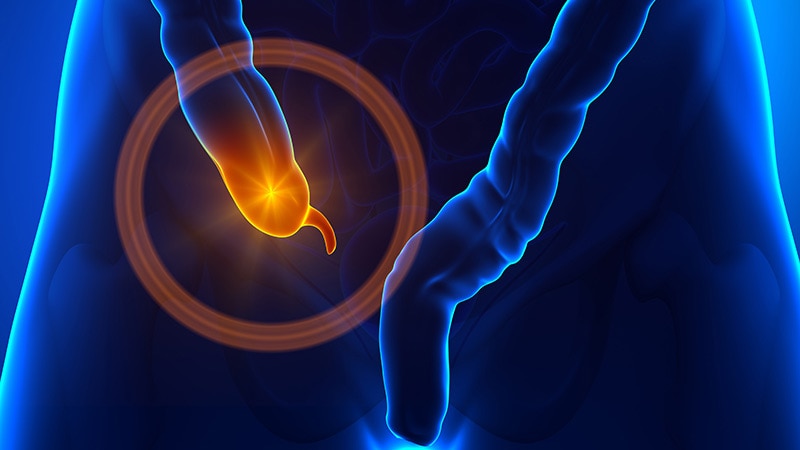The study was published on researchsquare.com as a preprint and has not yet been peer reviewed.
Key Takeaways
-
Appendicitis induced by immune-checkpoint inhibitors (ICIs) presents in a manner similar to that of conventional appendicitis, and complications rates and responses to treatment are similar.
-
The absence of diarrhea clinically distinguishes ICI-induced appendicitis from ICI-induced colitis.
Why This Matters
-
Appendicitis is being recognized as a rare side effect of ICI therapy, but it’s been unclear how much ICI-induced appendicitis has in common with conventional appendicitis.
-
The study suggests there is considerable overlap in both presentation and management.
Study Design
-
Investigators reviewed 13,991 patients exposed to ICIs at the MD Anderson Cancer Center in Houston from 2010–2021 and identified 10 confirmed cases of ICI-induced appendicitis within 2 years of treatment initiation.
-
Melanoma and genitourinary tumors were the most common cancers among the 10 patients, and nine had stage IV disease.
Key Results
-
The median age at appendicitis diagnosis was 59 years; 7 of 10 patients were men.
-
The median time from ICI therapy initiation to appendicitis onset was 188 days, and the median number of ICI doses received was four.
-
Radiologic and pathologic findings were comparable to those of conventional appendicitis.
-
The most common presenting symptoms were abdominal pain (70%) and fever (40%), similar to conventional appendicitis.
-
Two patients had abscesses, and one had a perforation; rates were similar to those with conventional disease.
-
All 10 patients received combinations of broad-spectrum antibiotics that are routinely used to treat conventional appendicitis, with the occasional addition of less frequently used antibiotics, such as vancomycin and aztreonam, or antifungals.
-
Durations of antibiotic use ranged from 5 days to 6 weeks; durations were longer for patients who were unable to undergo appendectomy.
-
Five patients underwent surgery or interventional radiology drainage.
-
Symptoms resolved for nine patients after treatment; one patient was unable to have surgery, and symptoms did not fully resolve with antibiotics. The patient died of ICI-induced pneumonitis.
-
No patients showed evidence of concurrent colitis; the absence of diarrhea clinically distinguished ICI-induced appendicitis from ICI-induced colitis.
-
ICI therapy was resumed for eight patients, and four developed additional ICI adverse events.
Limitations
-
It was a retrospective, single-center, small-scale study.
-
The incidence of appendicitis might be underestimated. Given the overlap of appendicitis symptoms and other gastrointestinal diseases and the frequent use of antibiotics for cancer patients, cases may have been missed.
-
There was no microbiome analysis.
Disclosures
-
The study received no funding, and the investigators have disclosed no relevant financial relationships.
This is a summary of a preprint research study, “Characteristics of Appendicitis After Immune Checkpoint Inhibitor Therapy Among Cancer Patients,” led by Antony Mathew of the University of Texas Health Science Center at Houston, provided to you by Medscape. The study has not been peer reviewed. The full text can be found at researchsquare.com.
M. Alexander Otto is a physician assistant with a master’s degree in medical science and a journalism degree from Newhouse. He is an award-winning medical journalist who has worked for several major news outlets before joining Medscape and also an MIT Knight Science Journalism fellow. Email: [email protected].
For more news, follow Medscape on Facebook, Twitter, Instagram, and YouTube.
Source: Read Full Article






